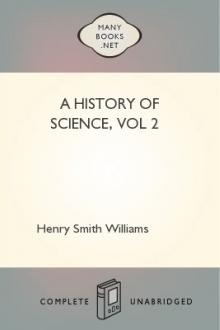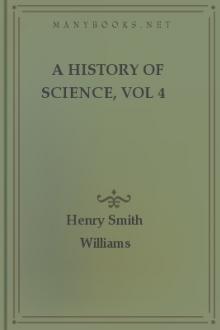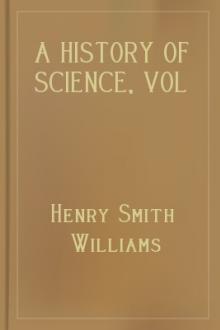A History of Science, vol 2, Henry Smith Williams [read this if txt] 📗

- Author: Henry Smith Williams
- Performer: -
Book online «A History of Science, vol 2, Henry Smith Williams [read this if txt] 📗». Author Henry Smith Williams
A
HISTORY OF SCIENCE
BY
HENRY SMITH WILLIAMS, M.D., LL.D.
ASSISTED BY
EDWARD H. WILLIAMS, M.D.
IN FIVE VOLUMES
VOLUME II.
CONTENTS
CHAPTER I. SCIENCE IN THE DARK AGE
CHAPTER II. MEDIAEVAL SCIENCE AMONG THE ARABIANS
CHAPTER III. MEDIAEVAL SCIENCE IN THE WEST
CHAPTER IV. THE NEW COSMOLOGY—COPERNICUS TO KEPLER AND GALILEO
CHAPTER V. GALILEO AND THE NEW PHYSICS
CHAPTER VI. TWO PSEUDO-SCIENCES—ALCHEMY AND ASTROLOGY
CHAPTER VII. FROM PARACELSUS TO HARVEY
CHAPTER VIII. MEDICINE IN THE SIXTEENTH AND SEVENTEENTH CENTURIES
CHAPTER IX. PHILOSOPHER-SCIENTISTS AND NEW INSTITUTIONS OF
LEARNING
CHAPTER X. THE SUCCESSORS OF GALILEO IN PHYSICAL SCIENCE
CHAPTER XI. NEWTON AND THE COMPOSITION OF LIGHT
CHAPTER XII. NEWTON AND THE LAW OF GRAVITATION
CHAPTER XIII. INSTRUMENTS OF PRECISION IN THE AGE OF NEWTON
CHAPTER XIV. PROGRESS IN ELECTRICITY FROM GILBERT AND VON
GUERICKE TO FRANKLIN
CHAPTER XV. NATURAL HISTORY TO THE TIME OF LINNAEUS
APPENDIX
A HISTORY OF SCIENCE
The studies of the present book cover the progress of science from the close of the Roman period in the fifth century A.D. to about the middle of the eighteenth century. In tracing the course of events through so long a period, a difficulty becomes prominent which everywhere besets the historian in less degree—a difficulty due to the conflict between the strictly chronological and the topical method of treatment. We must hold as closely as possible to the actual sequence of events, since, as already pointed out, one discovery leads on to another. But, on the other hand, progressive steps are taken contemporaneously in the various fields of science, and if we were to attempt to introduce these in strict chronological order we should lose all sense of topical continuity.
Our method has been to adopt a compromise, following the course of a single science in each great epoch to a convenient stopping-point, and then turning back to bring forward the story of another science. Thus, for example, we tell the story of Copernicus and Galileo, bringing the record of cosmical and mechanical progress down to about the middle of the seventeenth century, before turning back to take up the physiological progress of the fifteenth and sixteenth centuries. Once the latter stream is entered, however, we follow it without interruption to the time of Harvey and his contemporaries in the middle of the seventeenth century, where we leave it to return to the field of mechanics as exploited by the successors of Galileo, who were also the predecessors and contemporaries of Newton.
In general, it will aid the reader to recall that, so far as possible, we hold always to the same sequences of topical treatment of contemporary events; as a rule we treat first the cosmical, then the physical, then the biological sciences. The same order of treatment will be held to in succeeding volumes.
Several of the very greatest of scientific generalizations are developed in the period covered by the present book: for example, the Copernican theory of the solar system, the true doctrine of planetary motions, the laws of motion, the theory of the circulation of the blood, and the Newtonian theory of gravitation. The labors of the investigators of the early decades of the eighteenth century, terminating with Franklin’s discovery of the nature of lightning and with the Linnaean classification of plants and animals, bring us to the close of our second great epoch; or, to put it otherwise, to the threshold of the modern period,
I. SCIENCE IN THE DARK AGE
An obvious distinction between the classical and mediaeval epochs may be found in the fact that the former produced, whereas the latter failed to produce, a few great thinkers in each generation who were imbued with that scepticism which is the foundation of the investigating spirit; who thought for themselves and supplied more or less rational explanations of observed phenomena. Could we eliminate the work of some score or so of classical observers and thinkers, the classical epoch would seem as much a dark age as does the epoch that succeeded it.
But immediately we are met with the question: Why do no great original investigators appear during all these later centuries?
We have already offered a part explanation in the fact that the borders of civilization, where racial mingling naturally took place, were peopled with semi-barbarians. But we must not forget that in the centres of civilization all along there were many men of powerful intellect. Indeed, it would violate the principle of historical continuity to suppose that there was any sudden change in the level of mentality of the Roman world at the close of the classical period. We must assume, then, that the direction in which the great minds turned was for some reason changed. Newton is said to have alleged that he made his discoveries by “intending” his mind in a certain direction continuously. It is probable that the same explanation may be given of almost every great scientific discovery. Anaxagoras could not have thought out the theory of the moon’s phases; Aristarchus could not have found out the true mechanism of the solar system; Eratosthenes could not have developed his plan for measuring the earth, had not each of these investigators “intended” his mind persistently towards the problems in question.
Nor can we doubt that men lived in every generation of the dark age who were capable of creative thought in the field of science, bad they chosen similarly to “intend” their minds in the right direction. The difficulty was that they did not so choose. Their minds had a quite different bent. They were under the spell of different ideals; all their mental efforts were directed into different channels. What these different channels were cannot be in doubt—they were the channels of oriental ecclesiasticism. One all-significant fact speaks volumes here. It is the fact that, as Professor Robinson[1] points out, from the time of Boethius (died 524 or 525 A.D.) to that of Dante (1265-1321 A.D.) there was not a single writer of renown in western Europe who was not a professional churchman. All the learning of the time, then, centred in the priesthood. We know that the same condition of things pertained in Egypt, when science became static there. But, contrariwise, we have seen that in Greece and early Rome the scientific workers were largely physicians or professional teachers; there was scarcely a professional theologian among them.
Similarly, as we shall see in the Arabic world, where alone there was progress in the mediaeval epoch, the learned men were, for the most part, physicians. Now the meaning of this must be self-evident. The physician naturally “intends” his mind towards the practicalities. His professional studies tend to make him an investigator of the operations of nature. He is usually a sceptic, with a spontaneous interest in practical science. But the theologian “intends” his mind away from practicalities and towards mysticism. He is a professional believer in the supernatural; he discounts the value of merely “natural”
phenomena. His whole attitude of mind is unscientific; the fundamental tenets of his faith are based on alleged occurrences which inductive science cannot admit—namely, miracles. And so the minds “intended” towards the supernatural achieved only the hazy mysticism of mediaeval thought. Instead of investigating natural laws, they paid heed (as, for example, Thomas Aquinas does in his Summa Theologia) to the “acts of angels,” the “speaking of angels,” the “subordination of angels,” the “deeds of guardian angels,” and the like. They disputed such important questions as, How many angels can stand upon the point of a needle? They argued pro and con as to whether Christ were coeval with God, or whether he had been merely created “in the beginning,” perhaps ages before the creation of the world. How could it be expected that science should flourish when the greatest minds of the age could concern themselves with problems such as these?
Despite our preconceptions or prejudices, there can be but one answer to that question. Oriental superstition cast its blight upon the fair field of science, whatever compensation it may or may not have brought in other fields. But we must be on our guard lest we overestimate or incorrectly estimate this influence.
Posterity, in glancing backward, is always prone to stamp any given age of the past with one idea, and to desire to characterize it with a single phrase; whereas in reality all ages are diversified, and any generalization regarding an epoch is sure to do that epoch something less or something more than justice. We may be sure, then, that the ideal of ecclesiasticism is not solely responsible for the scientific stasis of the dark age. Indeed, there was another influence of a totally different character that is too patent to be overlooked—the influence, namely, of the economic condition of western Europe during this period. As I have elsewhere pointed out,[2] Italy, the centre of western civilization, was at this time impoverished, and hence could not provide the monetary stimulus so essential to artistic and scientific no less than to material progress. There were no patrons of science and literature such as the Ptolemies of that elder Alexandrian day. There were no great libraries; no colleges to supply opportunities and afford stimuli to the rising generation. Worst of all, it became increasingly difficult to secure books.
This phase of the subject is often overlooked. Yet a moment’s consideration will show its importance. How should we fare to-day if no new scientific books were being produced, and if the records of former generations were destroyed? That is what actually happened in Europe during the Middle Ages. At an earlier day books were made and distributed much more abundantly than is sometimes supposed. Bookmaking had, indeed, been an important profession in Rome, the actual makers of books being slaves who worked under the direction of a publisher. It was through the efforts of these workers that the classical works in Greek and Latin were multiplied and disseminated. Unfortunately the climate of Europe does not conduce to the indefinite preservation of a book; hence very few remnants of classical works have come down to us in the original from a remote period. The rare exceptions are certain papyrus fragments, found in Egypt, some of which are Greek manuscripts dating from the third century B.C. Even from these sources the output is meagre; and the only other repository of classical books is a single room in the buried city of Herculaneum, which contained several hundred manuscripts, mostly in a charred condition, a considerable number of which, however, have been unrolled and found more or less legible. This library in the buried city was chiefly made up of philosophical works, some of which were quite unknown to the modern world until discovered there.
But this find, interesting as it was from an archaeological stand-point, had no very important bearing on our knowledge of the literature of antiquity. Our chief dependence for our knowledge of that literature must still be placed in such copies of books as were made in the successive generations.
Comparatively few of the extant manuscripts are older than the tenth century of our era. It requires but a momentary consideration of the conditions under which ancient books were produced to realize how slow and difficult the process was before the invention of printing. The taste of the book-buying public demanded a clearly written text, and in the Middle Ages it became customary to produce a richly ornamented text as well. The script employed being the prototype of the modern printed text, it will be obvious that a scribe could produce but a few pages at best in a day. A large work would therefore require the labor of a scribe for many months or even for several years. We may assume, then, that it would be a





Comments (0)